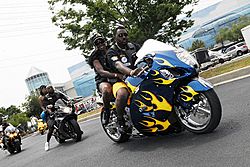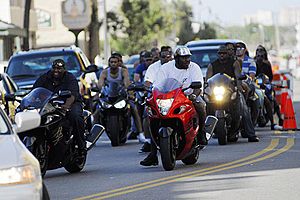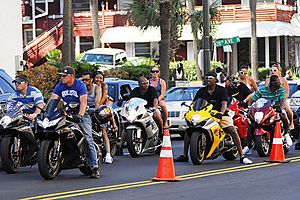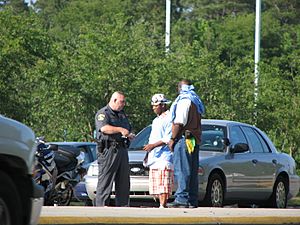Black Bike Week facts for kids
Quick facts for kids Black Bike Week |
|
|---|---|

A custom Suzuki Hayabusa at Black Bike Week
|
|
| Genre | Motorcycle rally |
| Date(s) | Memorial Day weekend |
| Frequency | Annual |
| Location(s) | Greater Grand Strand, South Carolina |
| Years active | 45 |
| Inaugurated | 1980 |
| Participants | 350,000 |
Black Bike Week, also known as Atlantic Beach Bikefest or The Black Pearl Cultural Heritage and Bike Festival, is a big yearly event for motorcycle riders. It takes place in the Myrtle Beach, South Carolina area during the Memorial Day weekend. People describe it as a special event where riders can show off their cool bikes and enjoy the atmosphere.
This rally is the largest gathering of African American motorcyclists in the United States. Many people attend, with numbers often reported between 350,000 and 400,000. It is considered one of the largest motorcycle rallies in the country. It's also notable because nearly half of the participants are women, which is a much higher percentage than at other major motorcycle events.
For many years, until 2008, Myrtle Beach also hosted a different motorcycle rally, mainly for white riders, called Harley-Davidson Week. These two events often happened around the same time. Over the years, there have been concerns and legal actions about how the city treated the Black Bike Week differently. For example, there were different traffic rules and more police presence during the black rally. Groups like the National Association for the Advancement of Colored People (NAACP) have said this was unfair. In 2002, Black Bike Week had more attendees than the Harley-Davidson Week.
The city of Myrtle Beach tried to move both motorcycle events out of the city in 2009 and 2010 by creating new rules. However, other nearby towns and businesses welcomed the bikers, and many still came to the area. In 2010, the South Carolina Supreme Court overturned some of Myrtle Beach's rules, including one that required all motorcyclists to wear helmets.
The name "Black Bike Week" can also refer to a smaller event that happens alongside the main Daytona Beach Bike Week in Florida. This Daytona event also started because black riders were not allowed in the main festival, so they created their own.
Contents
How Black Bike Week Started
In the 1960s and 1970s, many black motorcyclists visited Atlantic Beach, South Carolina. They rode various types of motorcycles, including Harley-Davidsons and Japanese brands like Honda and Suzuki. During a time when racial segregation was common in the United States, Atlantic Beach was one of the few beaches in the South where black people were allowed to visit.
The Black Bike Week rally, first called the Atlantic Beach Memorial Day BikeFest, began in Atlantic Beach in 1980. It was started by a motorcycle club called the Flaming Knight Riders. About 100 people attended the first rally. Over time, more and more bikers started gathering in Myrtle Beach instead of Atlantic Beach. The Flaming Knight Riders club later changed its name to the Carolina Knight Riders in 1982.
By the 1990s, the event had grown to include the entire Myrtle Beach area, also known as the Grand Strand. In 2002, Atlantic Beach worked to promote itself and the motorcycle rally as a unique vacation spot.
The mostly white Harley-Davidson rally started much earlier, in May 1940. It was created by Harley-Davidson dealers and included rides, races, and other fun activities. This rally moved to different locations over the years before returning to Myrtle Beach.
What Happens at Atlantic Beach Bikefest
The town of Atlantic Beach hosts a street festival called The Atlantic Beach Bikefest during the Memorial Day Black Bike Week weekend.
At Bikefest, you can see custom motorcycle builders, parts suppliers, and dealers showing off their products. There are also exciting motorcycle stunt shows and other entertainment. Motorcycle clubs often meet up and connect with each other, making it a big social event where clubs can show their pride and have fun.
While there have been attempts to organize all the events, much of the activity is spontaneous. People enjoy cruising around, having street parties, dancing, and even hopping on the back of strangers' bikes for a ride. Vendors sell food, T-shirts, music, and offer rides on customized motorcycles. There's also live entertainment, including gospel music and daily stunt shows.
In 2010, more people attended the Bikefest events in Atlantic Beach than in 2009. There was also a greater variety of entertainment and things to buy. The town manager noted that more families with children were attending, and more vendors were selling bike parts and upgrades.
To help with traffic flow, especially after some safety concerns in 2014, a special 23-mile traffic loop was approved for Memorial Day weekend 2015. This loop helped manage traffic on busy roads like Ocean Boulevard. Police said the loop worked well, though some bikers found it confusing. The loop was used again in 2016 and 2017. The NAACP felt the loop was unfair because it was only used for this one event and filed a lawsuit. Since then, traffic plans have been adjusted, often making Ocean Boulevard southbound only in certain areas.
As of 2017, the event was officially called The Black Pearl Cultural Heritage and Bike Festival.
In 2020 and 2021, the Atlantic Beach Bikefest was postponed and then canceled due to the COVID-19 pandemic. However, the festival resumed in May 2022. In March 2022, the town council voted not to allow open carry of weapons during events.
Concerns About Fair Treatment
In 2003, a group of black motorcyclists and the South Carolina chapter of the NAACP took legal action against the city of Myrtle Beach and some local businesses. They claimed that black bikers were treated unfairly, with accusations of strict traffic enforcement and excessive police actions. Many businesses also closed or reduced their hours during Black Bike Week. A police detective and motorcyclist from Baltimore told The New York Times that when white bikers came to Myrtle Beach, they were welcomed, but when black riders came, the welcome seemed to disappear. City officials argued that the larger and sometimes younger crowds at Black Bike Week required a different response.
In 2008, the NAACP announced success in resolving several federal discrimination lawsuits related to bike week events between 1999 and 2003. As part of a settlement with the city, the police department agreed to use the same traffic patterns for Black Bike Week as they did for Harley Bike Week.
From 2005 to 2008, the NAACP ran "Operation Bike Week Justice." They set up a hotline for complaints and had teams monitor how African Americans were treated by police and local businesses, as well as traffic patterns.
One lawsuit involved The Yachtsman Resort Hotel, which was accused of requiring Black Bike Week guests to sign a special contract with many rules, prepay for their stay, and show photo ID. The hotel agreed to a settlement, including a payment and changes to its policies, such as yearly anti-discrimination training for employees. The hotel did not have to admit to discrimination.
The NAACP continued to monitor police and local businesses for possible unfair treatment in the years that followed. In 2018, the NAACP and others sued the city of Myrtle Beach again, claiming police officers treated African Americans differently. In December 2020, a jury ruled that while the actions were "racially motivated," they would likely have been the same even without race being a factor.
Myrtle Beach Rules for Rallies
In 2008, the Myrtle Beach City Council decided it would no longer host motorcycle rallies. They passed new rules that limited muffler noise, required helmets within city limits, restricted parking, and more. Despite these rules, attendance at Black Bike Week in 2009 was only slightly lower. Many vendors, hotels, and biker groups still planned events for Black Bike Week 2010, even with the city's new rules.
Local Harley-Davidson dealerships and rally organizers encouraged attendees to support businesses outside the city limits that welcomed bikers. The Carolina Harley-Davidson Dealers Association even moved its event to New Bern, North Carolina, in 2009 and 2010 because of Myrtle Beach's new laws.
Helmet Law Overturned
On June 8, 2010, the South Carolina Supreme Court overturned Myrtle Beach's rule that all motorcyclists had to wear helmets. The court said that state law, which only requires helmets for riders under 21, could not be changed by a city rule. The court also noted that the city's rule caused confusion for riders. This ruling meant that tickets given under the helmet rule had to be dismissed, and any fines collected had to be returned.
The court heard arguments from two groups who wanted to overturn the rule: 49 motorcyclists who had received tickets and a group called Business Owners Organized to Save Tourism (BOOST), along with State Representative Thad Viers. BOOST's goal is to stop practices where some tourists are welcomed while others are discouraged.
During the hearing, one Justice questioned whether the city's real reason for the helmet law was to stop motorcycle rallies, not just to promote safety. The city argued that its helmet law was constitutional and that it had the right to make its own rules for riders over 21 since state law was silent on that age group.
The ruling led to discussions about whether more motorcyclists would return to Myrtle Beach. Some immediately booked rooms for the next year, while others decided they would only support businesses outside the city.
Myrtle Beach Changes Noise Rules
After a lawsuit was filed against the city's noise rules, the Myrtle Beach city council increased the noise limit for motor vehicles. Vehicles can now operate at up to 99 decibels, which is more in line with national standards.
Safety Measures and Changes
During the 2014 Atlantic Beach Bikefest, there were some serious incidents in Myrtle Beach. After these events, South Carolina Governor Nikki Haley suggested that the Bikefest should end because it was hurting the area's reputation. However, the Mayor of Atlantic Beach said the event would not be canceled, pointing out that most bikers are good people.
At a meeting in September 2014, Governor Haley said that the event could continue if organizers followed certain rules.
See also
- Urban Beach Week, another event held on Memorial Day weekend.
 | Jessica Watkins |
 | Robert Henry Lawrence Jr. |
 | Mae Jemison |
 | Sian Proctor |
 | Guion Bluford |




